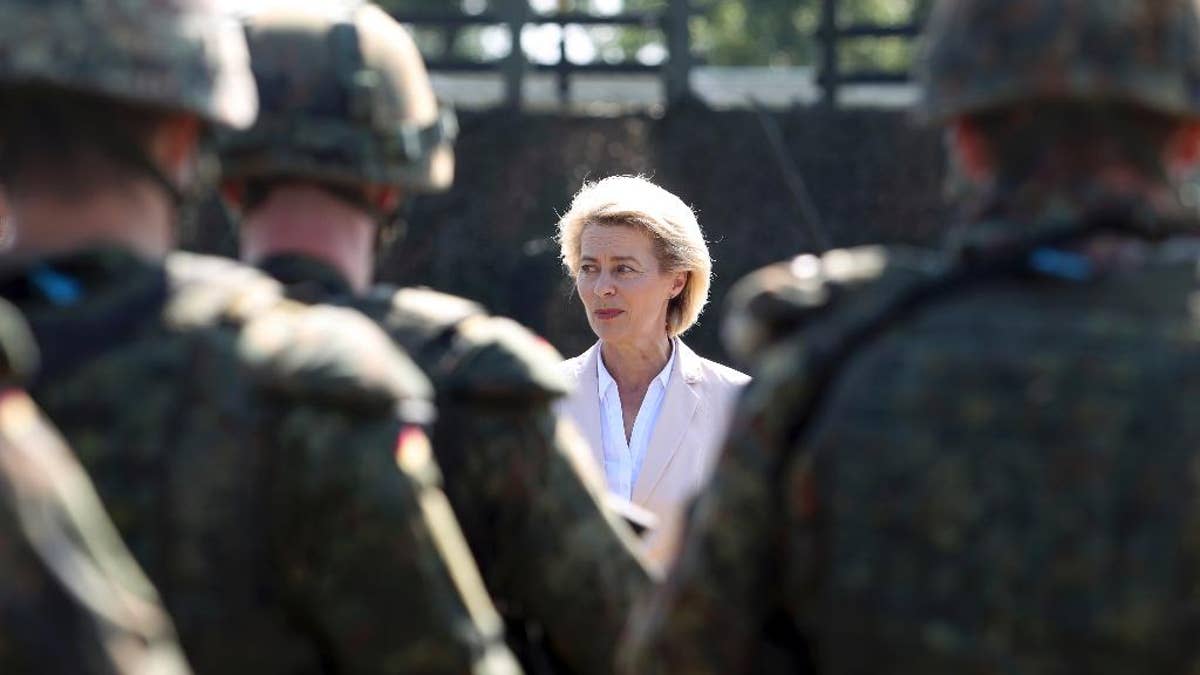
FILE - In this Aug. 16, 2016 file photo German Defence Minister Ursula von der Leyen speaks to soldiers from the German army in Weissenfels, Germany. Federal prosecutor's spokeswoman Frauke Koehler said that 27-year-old Maximilian T. was arrested in the southwestern city of Kehl on Tuesday, May 9, 2017 on charges of preparing an act of violence. (Sebastian Willnow/dpa via AP, file) (The Associated Press)
BERLIN – German authorities arrested a second soldier Tuesday on allegations he was part of a far-right plot to assassinate prominent political figures and blame the attack on refugees in a case that has raised concerns about extremism within the country's military.
Maximilian T., 27, was arrested in the southwestern city of Kehl on charges of preparing an act of violence, federal prosecutor's spokeswoman Frauke Koehler said.
His apprehension follows the arrest last month of 28-year-old Lt. Franco A., a Bundeswehr soldier stationed with a Franco-German brigade in Illkirch, just across the border from Kehl in France. Their last names weren't released in line with privacy laws.
In a case authorities have called "more than strange," A. is alleged to have managed to pass himself off as a Syrian refugee in the state of Hesse at the end of 2015 and be granted a place at a home for asylum-seekers, as well as state financial aid for migrants. Though stationed with the Bundeswehr in France, he lived sporadically at the refugee home and T. is alleged to have covered him, at times, when he was absent from the barracks, prosecutors said.
A. came to the attention of authorities after he was arrested in February while going to retrieve a pistol he'd stashed in a Vienna airport bathroom. He was freed, but Austrian authorities informed Germany, and when the soldier's fingerprint matched the one he'd given when he registered as a refugee, it triggered the current investigation.
In addition to the two soldiers, a 24-year-old student from A.'s hometown of Offenbach, Matthias F., has also been arrested.
Koehler said the three are believed to have been planning to attack "high-ranking politicians and public figures who, in the eyes of the suspects, engaged in failed refugee policies." Among others on a list they put together were former German President Joachim Gauck, and Justice Minister Heiko Maas, she said.
A. was to carry out the attack under his "fictitious identity" as a Syrian refugee, Koehler said.
"In this way the three suspects wanted to link the attack in Germany to asylum seekers," she said.
A. was supposed to carry out the attack, using the 7.65 mm pistol stashed in the Vienna airport, which Koehler identified as a "Model 17" produced by the French firm Manufacture d'Armes des Pyrenees Francais, a World War II-era weapon used by the German armed forces, among others.
Defense Minister Ursula von der Leyen canceled a visit to the U.S. after the case broke, and met with top members of Germany's military last week to try and determine where mistakes were made.
Among other things, A. came to the attention of superiors for expressing what von der Leyen called "clearly racist and far-right extremist" views in a 2014 dissertation written as part of his officer's training, but was let off with a warning.
Bundeswehr chief of staff Volker Wieker has promised a full investigation, saying there is no indication of widespread right-wing extremism in the military, but that the case has raised "justified concern."








































